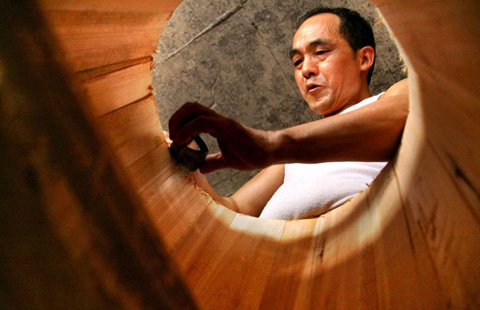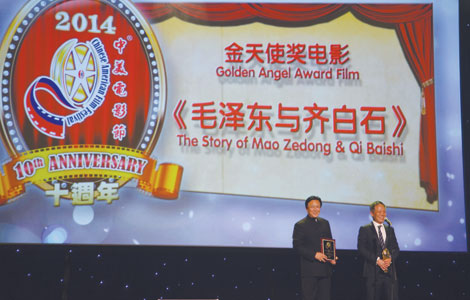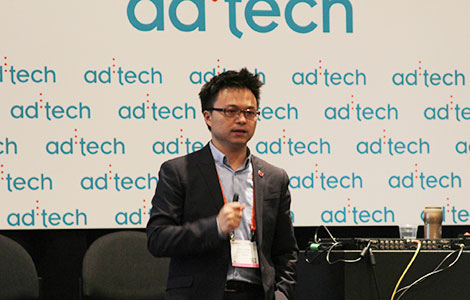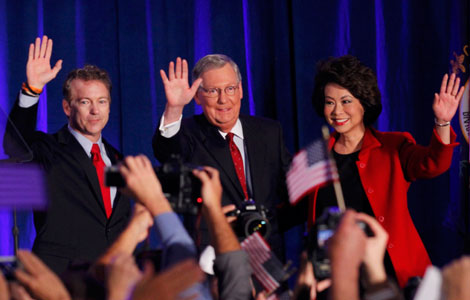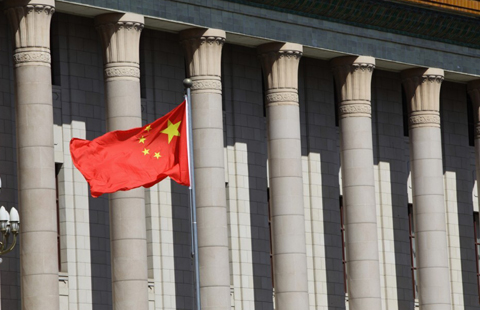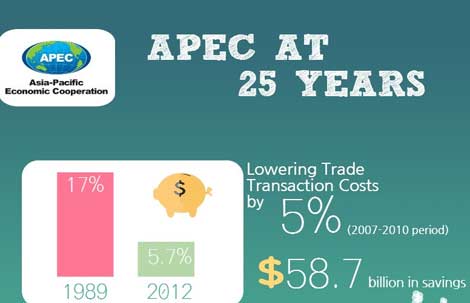Kerry, Cui reaffirm bilateral ties
Updated: 2014-11-05 12:01
By Chen Weihua in Washington(China Daily USA)
|
||||||||
US Secretary of State says ties are no longer based on narrow issues
Senior Chinese and US diplomats stressed the importance of a constructive and productive bilateral relationship ahead of President Barack Obama's trip to China next week for the APEC leaders summit and a one-day state visit there.
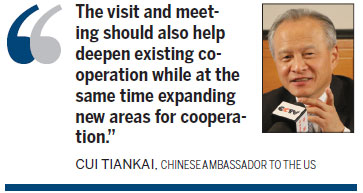
US Secretary of State John Kerry described the bilateral relationship as the most consequential in the world today and said it will do much to determine the shape of the 21st century.
"That means that we have to get it right," Kerry said on Tuesday to students at the Johns Hopkins University School of Advanced International Studies in Washington.
He said the Obama administration has been committed to advancing a principled and productive relationship with China, noting that the world's two major powers and largest economies have a profound opportunity to set a constructive course on any number of issues, from climate change to global trade.
"For that reason, our relationship has to be carefully managed and guided, not by news hooks and grand gestures, but by a long-term strategic vision, by hard work, by good diplomacy and by good relationships," he said.
He believes US-China ties used to be a relationship centered on a narrow set of bilateral and regional matters, but has now expanded to tackle some of the most complex global challenges.
"And we're able to do that because together our nations are working closely in order to avoid the historic pitfall of strategic rivalry between an emerging power and an existing power. Instead, we're focusing on the steps that we need to take to ensure that we not only co-exist, but that we cooperate," Kerry said.
The top US diplomat described constructively coordinating efforts on a wide range of issues where the two countries' interests are aligned and constructively managing differences as the two pillars of the US policy toward China.
"Now make no mistake, we are clear-eyed about the fact that the United States and China are markedly different countries. We have different political systems, different histories, different cultures, and most importantly, different views on certain significant issues," he said.
"Our differences will undoubtedly continue to test the relationship," Kerry said. "But they should not, and in fact, must not prevent us from acting cooperatively in other areas."
Kerry believes there is a huge potential for bilateral economic and trade ties, but he said the aligned interests of the two countries are more than this, citing climate change, nuclear non-proliferation, Afghanistan and the fight against Ebola, which China has committed a large amount of aid and dispatched medical personnel to West Africa.
"The fact is that among the major threats and crises that face the world today, there really isn't one that couldn't be addressed more effectively with expanded US-China cooperation," Kerry said.
He said the path to a productive relationship between the two countries has seen its bumps, and it may see more. "But the fact is that it has never been more important to us to be able to continue down the path that we are on. Our two nations face a genuine test of relationship. We have to make the right choices in both Washington and in Beijing," Kerry said.
Chinese Ambassador to the US Cui Tiankai, who was in the audience during Kerry's speech, told Chinese news media on Tuesday afternoon that Xi and Obama should affirm the positive progress made in building a new type of major country relationship since their informal summit in the Annenberg retreat in Sunnylands, California, last year, while also making a blueprint, reaffirming their promises and putting forward the goal of continuing to push forward the new type of relationship.
Obama is visiting China for the second time as US president. His last visit was in November 2009, 10 months after he first took office. Cui described Obama's visit as a continuation of close contacts between the two leaders.
He said the visit will feature both a bilateral agenda as well as multilateral activities in the APEC summit, both formal state visits as well as a special arrangement for in-depth talks between the two leaders.
"The visit and meeting should also help deepen existing cooperation while at the same time expanding new areas for cooperation. They should demonstrate the fruitful results of China-US cooperation and at the same time show their determination and capability to constructively manage and control their differences," Cui said.Cui said he hopes that the visit and meeting will leave a "clear, active and solid footprint" in the bilateral relationship.
Cheng Li, director of the John L. Thornton China Center at the Brookings Institute, described Kerry's speech as a positive one. He believes one or two meetings every year between the heads of state will help the bilateral relations stay on the right course.
Li believes the preoccupation with tensions in the East and South China seas has distracted attention from more cooperation. "The areas China decided to open up after the Third Plenum (of the 18th Party Central Committee) are all a strong suit for the US, while China also needs to expand in the US market," Li said.
Douglas Paal, vice-president for studies at the Carnegie Endowment for International Peace, described Kerry's speech as an unambitious agenda.
"I think the take away quote from Kerry's remarks is that the US is not going to agree to disagree. This will allow officials to claim that there are some small agreements emerging from the summit, but that Obama was not nave and stood his ground on issues such as human rights and the manner in which the South China Sea disputes are managed, for example," he said.
chenweihua@chinadailyusa.com
Most Viewed
Editor's Picks

|

|

|

|
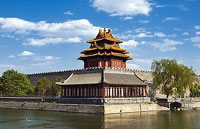
|
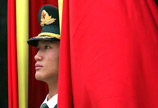
|
Today's Top News
New relationship to advance
Chinese lift profile in US elections
US-China trade deficit hits record high
Movie moguls gather at LA film summit
Oklahoma seeks Chinese investment
Festival pays tribute to Chinese film
Top Chinese violinist remembers New York
Shanghai FTZ explained
US Weekly

|

|
